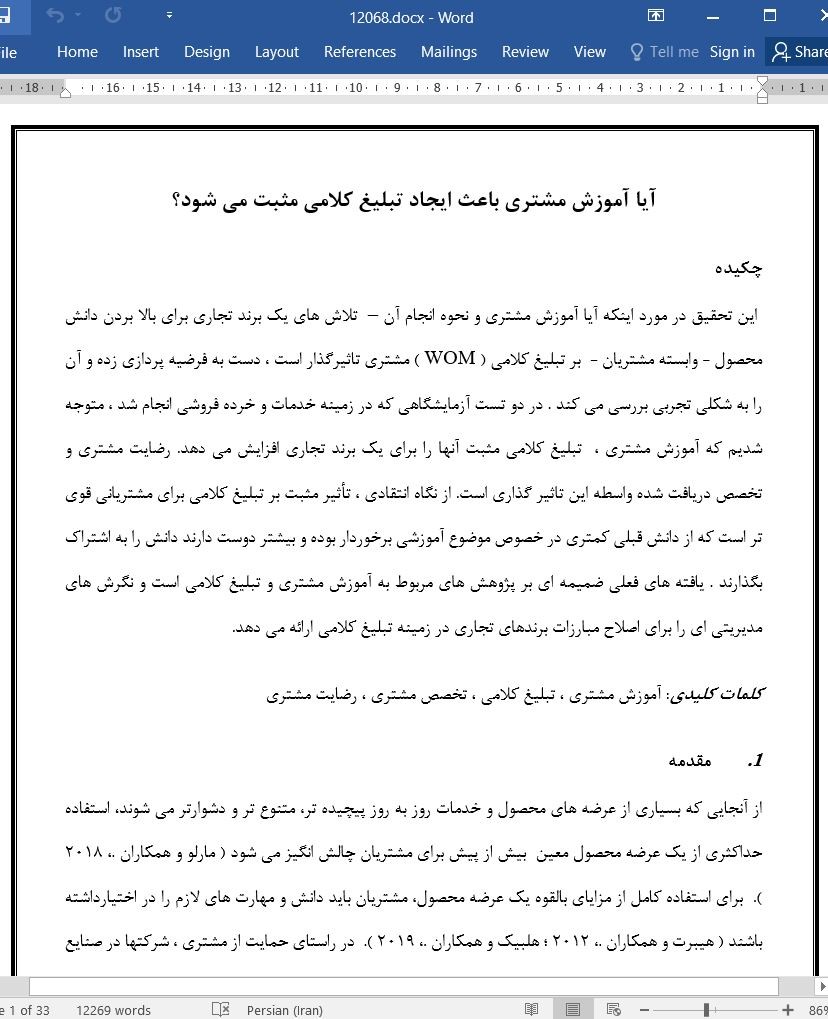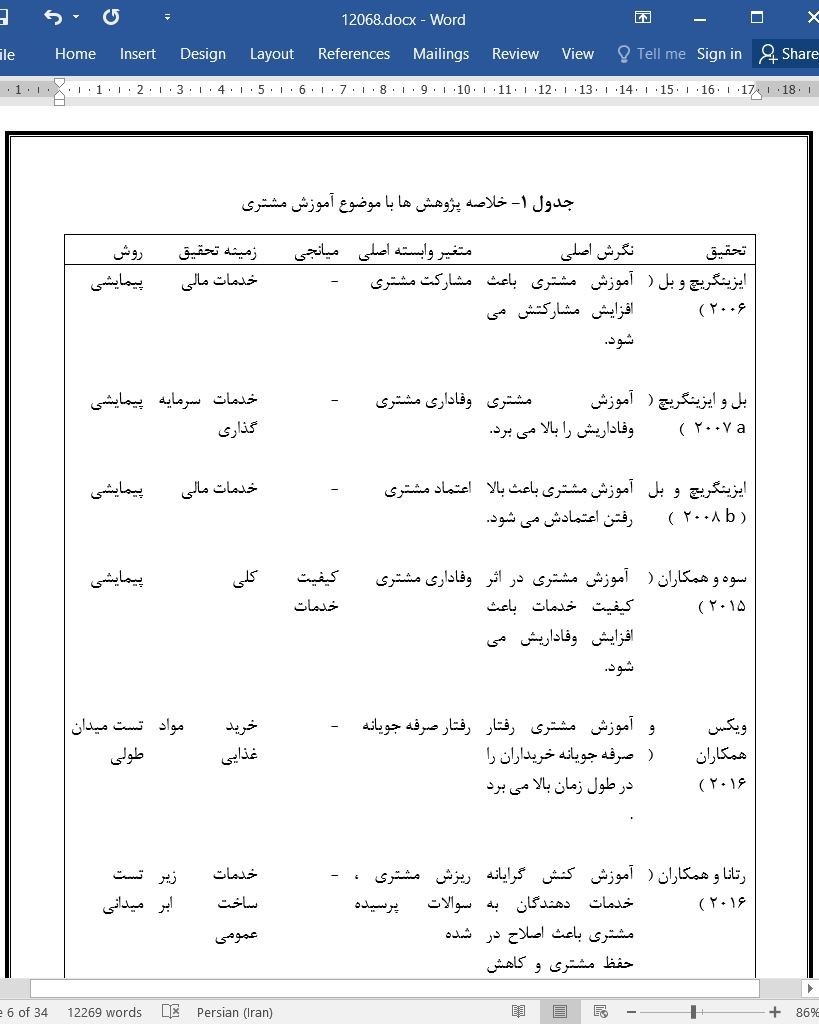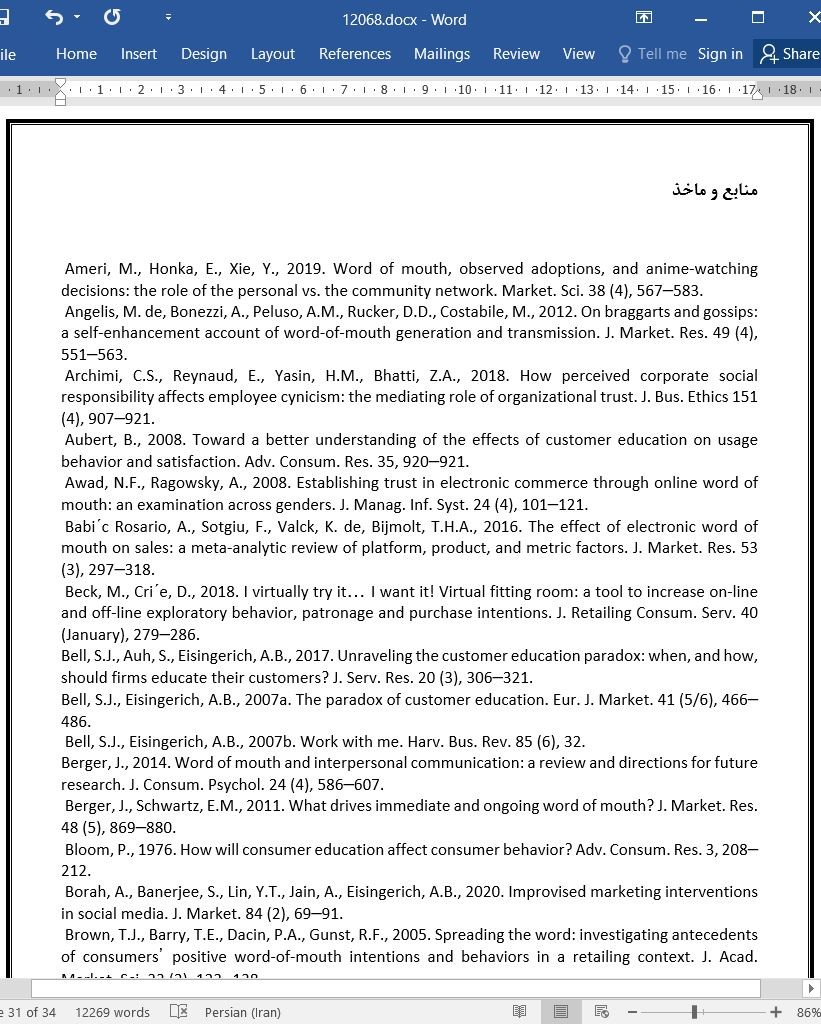
آیا آموزش مشتری باعث ایجاد تبلیغ کلامی مثبت می شود؟
چکیده
این تحقیق در مورد اینکه آیا آموزش مشتری و نحوه انجام آن – تلاش های یک برند تجاری برای بالا بردن دانش محصول - وابسته مشتریان - بر تبلیغ کلامی ( WOM ) مشتری تاثیرگذار است ، دست به فرضیه پردازی زده و آن را به شکلی تجربی بررسی می کند . در دو تست آزمایشگاهی که در زمینه خدمات و خرده فروشی انجام شد ، متوجه شدیم که آموزش مشتری ، تبلیغ کلامی مثبت آنها را برای یک برند تجاری افزایش می دهد. رضایت مشتری و تخصص دریافت شده واسطه این تاثیر گذاری است. از نگاه انتقادی ، تأثیر مثبت بر تبلیغ کلامی برای مشتریانی قوی تر است که از دانش قبلی کمتری در خصوص موضوع آموزشی برخوردار بوده و بیشتر دوست دارند دانش را به اشتراک بگذارند . یافته های فعلی ضمیمه ای بر پژوهش های مربوط به آموزش مشتری و تبلیغ کلامی است و نگرش های مدیریتی ای را برای اصلاح مبارزات برندهای تجاری در زمینه تبلیغ کلامی ارائه می دهد.
1. مقدمه
از آنجایی که بسیاری از عرضه های محصول و خدمات روز به روز پیچیده تر، متنوع تر و دشوارتر می شوند، استفاده حداکثری از یک عرضه محصول معین بیش از پیش برای مشتریان چالش انگیز می شود ( مارلو و همکاران .، 2018 ). برای استفاده کامل از مزایای بالقوه یک عرضه محصول، مشتریان باید دانش و مهارت های لازم را در اختیارداشته باشند ( هیبرت و همکاران .، 2012 ؛ هلبیک و همکاران .، 2019 ). در راستای حمایت از مشتری ، شرکتها در صنایع مختلف تلاش کرده اند دانش محصول – وابسته مشتریان را از طریق برنامه های آموزش مشتری افزایش دهند. آموزش مشتری اشاره دارد به تلاش برندها در ارائه نظام مند دانش، مهارت ها و توانایی های انتقادی به مشتری تا تجربه آنها را از یک عرضه محصول/ خدمات معین به حداکثر رسانده و بیشترین ارزش را از آن دریافت کنند ( بل و همکاران .، 2017 ؛ برتون ، 2002 ). حجم زیاد پژوهش های موجود بیانگر آن است که آموزش مشتری می تواند ، به عنوان مثال ، از طریق تغییردرنحوه درک مشتریان از برند ، بهبود کیفیت خدمات دریافت شده توسط مشتری ، جلب اعتماد وی ، و ایجاد پیوند نزدیکتر مشتری با برند، برای خود برند مفید باشد (بل و همکاران .، 2017؛ برتون.، 2002؛ ایزینگریچ و بل، a 2008، b 2008) .علاوه بر این، آگاهی تقویت شده مشتری در اثر تلاشها برای آموزش وی ، اساس درگیرسازی مشتری و خلق مشترک ارزش است( هلبیک و همکاران .،2019 ). آموزش مشتری ، با تجهیز مشتریان به دانش ، توانایی ها و انگیزه انتقادی برای انتقال نکات مثبت مربوط به محصول به دیگران ، می تواند تعاملات اجتماعی آنها را هم شکل دهد. با این حال، تا به امروزتحقیقات محدودی به این جنبه پرداخته است. تحقیق حاضر قصد دارد تاثیر آموزش مشتری را بر شکل مهمی از تعامل بین مشتریان – تبلیغ کلامی ( WOM ) – روشن سازد .
4.4. نتیجه گیری
در مجموع، آموزش مشتری پتانسیلی قوی برای کمک به برندها در کسب مزایایی رقابتی در مبارزات تبلیغ کلامی اشان دارد . با توجه به اهمیت روزافزون اشتراک گذاری و یادگیری دانش در جامعه امروزی و همچنین ضرورت شفافیت کسب و کار ، این تحقیق مفاهیم و دیدگاه های متعددی را هم از لحاظ نظری و هم مدیریتی ارائه می دهد. این یافته ها به ما کمک می کند تا بهتر بفهمیم که آیا، چرا، و چگونه آموزش مشتری می تواند تبلیغ کلامی مثبت را تقویت کرده و در نتیجه فرصتهایی برای پرداختن به مجموعه ای غنی از سوالات مرتبط ایجاد کند .
Abstract
This research theorizes and empirically examines whether and how educating customers—a brand's efforts to enhance customers' product-related knowledge—affects customer word of mouth (WOM). In two lab experiments across service and retailing contexts, we find that educating customers enhances customers' positive WOM for a brand. Customer satisfaction and perceived expertise mediate this effect. Critically, the positive impact on WOM is stronger for customers who have less prior knowledge regarding the educational topic and are more amenable to knowledge sharing. The current findings add to the literature on customer education and WOM and offer managerial insights for improving brands' WOM campaigns.
1. Introduction
As many product and service offerings get more complex, diverse, and complicated, making the most out of a given product offering becomes increasingly challenging for customers (Merlo et al., 2018). To fully utilize the potential benefits of a product offering, customers need to have the necessary knowledge and skills (Hibbert et al., 2012; Hollebeek et al., 2019). To support customers, companies in various industries have attempted to enhance customers’ product-related knowledge via customer education programs. Customer education refers to brands’ efforts to systematically provide customers with the critical knowledge, skills, and abilities to maximize their experience with a given product/service offering and obtain the most value from it (Bell et al., 2017; Burton, 2002). The extant body of literature shows that educating customers may benefit a brand by, for example, changing how customers perceive the brand, improving customers’ perceived service quality, building customer trust, and tying customers more closely to the brand (Bell et al., 2017; Burton, 2002; Eisingerich and Bell, 2008a, 2008b). Furthermore, customer learning supported by customer education efforts is central to customer engagement and value co-creation (Hollebeek et al., 2019). By equipping customers with critical knowledge, abilities, and motivation to communicate positive things about a product to others, educating customers might also shape their social interactions. However, limited research has considered this aspect to date. The current research aims to shed light on the influence of educating customers on an important form of interaction among customers—word of mouth (WOM).
4.4. Conclusion
In sum, customer education has a strong potential to help brands achieve competitive advantages in their WOM campaigns. Given the increasing importance of knowledge sharing and learning in today’s society as well as the need for business to be seen as transparent, our research provides several implications and insights, both theoretically and managerially. These findings help us better understand whether, why, and how educating customers could enhance positive WOM and therefore create possibilities to address a rich set of relevant questions.
چکیده
1 مقدمه
2 . پیشینه نظری
2.1. آموزش مشتری
2.2. تبلیغ کلامی
3. روش تحقیق
3.1. مروری بر مطالعات
3.2. تحقیق 1
3.3. تحقیق 2
4 بحث کلی
4.1. مشارکت های نظری
4.2. مفاهیم مدیریتی
4.3 محدودیت ها و تحقیقات آتی
4.4. نتیجه گیری
قدردانی ها
منابع و ماخذ
Abstract
Graphical abstract
1. Introduction
2. Theoretical background
2.1. Customer education
2.2. Word of mouth
2.3. Product-related knowledge, customer education, and word of mouth
3. Research method
3.1. Overview of studies
3.2. Study 1
3.3. Study 2
4. General discussion
4.1. Theoretical contributions
4.2. Managerial implications
4.3. Limitations and future research
4.4. Conclusion
Declaration of competing interest
Acknowledgments
References
- اصل مقاله انگلیسی با فرمت ورد (word) با قابلیت ویرایش
- ترجمه فارسی مقاله با فرمت ورد (word) با قابلیت ویرایش، بدون آرم سایت ای ترجمه
- ترجمه فارسی مقاله با فرمت pdf، بدون آرم سایت ای ترجمه



